


![]()
ONLINE

Very Optimistic About Peace
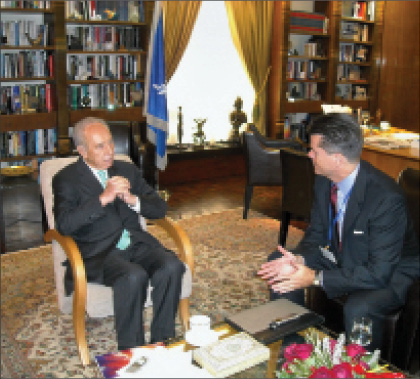
President Shimon Peres being interviewed by Patrick J. Gillis, LEADERS President, International
Editors’ Note
Elected Israel’s ninth president in 2007, Shimon Peres was twice Prime Minister of Israel: from 1984 to 1986, and again from 1995 to 1996. Before reaching that post, he was already a grand old figure of Israeli politics. He emigrated to Palestine from Poland in 1934, and was put in charge of Israel’s navy after the Israeli War of Independence. He served in the Defense Ministry and was elected in 1959 to the Knesset. In 1968, Peres helped found the Labor Party, and spent the next two decades jockeying with Yitzhak Rabin over control of the party and the government. When Rabin resigned in 1977, Peres served as acting Prime Minister. He was part of a National Unity Government after elections in 1984, serving as Prime Minister until 1986, when he handed the reins to Yitzhak Shamir. As Prime Minister, Peres moved toward peace with Palestine and withdrew Israeli troops from Lebanon. As Minister of Foreign Affairs, Peres participated in secret peace negotiations in Norway, and as a result, shared the 1994 Nobel Peace Prize with Rabin and Yasser Arafat. After Rabin’s assassination in 1995, Peres again became Prime Minister, but lost in the 1996 elections to Benjamin Netanyahu, and in 1997 declined to seek the leadership of the party. In November of 2005, Peres announced that he would quit the Labor party to join the sitting prime minister, Ariel Sharon, in a new centrist party known as Kadima. Peres has served in nearly all the top civilian posts in Israel and, after a string of election failures, was elected to the presidency in June of 2007, at the age of 83.
You’ve said, “The strength of Israel stems from her ethos, not her dimensions. As a nascent state she has stayed true to her moral and strategic commitment to be a democracy.” Could you elaborate on that, Mr. President?
In history, democratic countries rarely start wars. Yet across the globe, they have to fight in them. If our democracy lost the seven times non-democratic countries attacked us, we would cease to exist. Instead, we rely on our own strength – we stay true to our democratic principles. We do not ask for American soldiers to share our burden and we never take victory for granted.
You’ve talked a lot about Israel’s biggest threat being the threat of nuclear terrorism, and specifically Iran’s efforts to develop nuclear weapons. Iran’s President, as you know, has called for the eradication of the state of Israel. How do you see this issue evolving in coming years?
The President of Iran presents a serious danger. But the problem with Iran is not just Ahmadinejad or his nuclear ambitions. The problem is Iran’s dangerous combination of nuclear ambitions, terroristic activity, financial and military support of other terrorist groups, and direct threats to other countries. Iran is the only member of the United Nations that openly calls for the destruction of another member of the United Nations. It gives money and arms to terrorist groups such as Hamas and Hezbollah. It generates division in Syria and in Latin America. Its oil addiction has fueled an extremist regime. But the people of Iran grow tired of the unemployment and of the discrimination against women. You cannot feed children enriched uranium for breakfast, or grad missiles for lunch. The Iran we know is a great culture, a story in history. Thus, our problem is not with the people of Iran, but with the violence, extremism, hatred, and threats spread by its government.
You had the opportunity to meet President-elect Obama when he visited here this past July. What were your impressions of him?
He is a very intelligent man. He has a fresh eye and a new vision. Above all, he’s a real product of America, of the new America. America today is made up of so many different people. Yet, as a modern democracy, it tries to give an equal chance to every citizen. Diversity and democracy have made America the most innovative country in the world, a country oriented towards the future. These are America’s real strengths and President Obama reflects them well. In a short amount of time, he has managed to have a profound impact on the world mood. He has brought genuine peace back onto every agenda. For this, he deserves praise.
You’re very fond of talking about Israel’s emergence as a major high-tech and R&D-producing country. Why are you so optimistic and excited about this development here in Israel?
Part of our success stems from luck, but part of it stems from having no choice. We are a small country, with few natural resources, and no oil. Our only way to advance is sophistication; we have to always be on the cutting edge. A country with little land must be a country with a lot of science. So we have become leaders in high-tech, research and development, and nanotechnology. If we cannot be a global manufacturer, then we can be a global laboratory. I believe we have succeeded in doing just that.
You’ve always been an optimist about achieving a true peace between your country and countries that don’t care for Israel very much. Are you still as optimistic today as you have been in the past?
Yes. I think we are closer to peace with our neighbors. Today, the political differences are very small. The West Bank economy is flourishing. Our Prime Minister has committed to a two-state solution. The remaining differences are emotional, and these can be bridged. I think peace is closer at hand than it has been for a long time.•
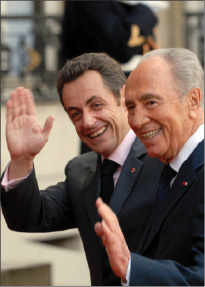
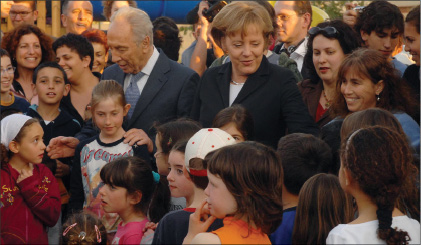
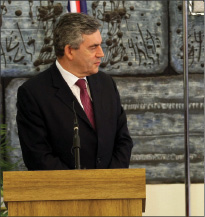
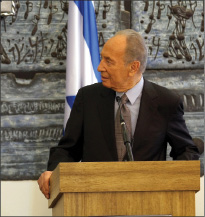
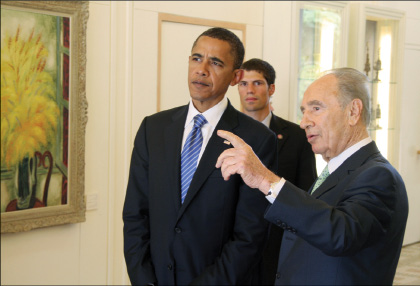
His Excellency Shimon Peres with French President Nicolas Sarkozy, German Chancellor Angela Merkel, British Prime Minister Gordon Brown, and then U.S. President-elect Barack Obama